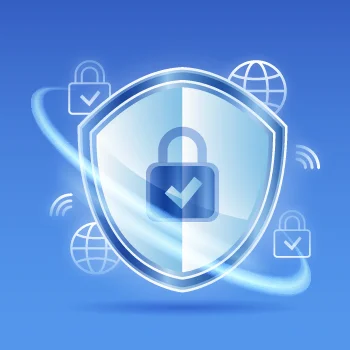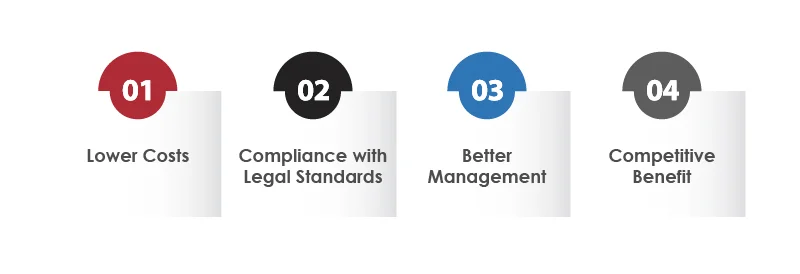- What is ISO 27001, and Who is it for?
- Why is ISO 27001 Compliance Important?
- How Many Controls does ISO 27001 have?
- Why do Businesses Require an Information Security Management System (ISMS)?
- How can TestingXperts (Tx) help with ISO 27001 Compliance Readiness?
- Summary
According to IBM’s Cost of Data Breach Report, the global average data breach cost reached $4.88 million in 2024 (a 10% increase compared to 2023), the most significant jump since the pandemic. 70% of breached organizations stated that the incident caused considerable disruption within their operations and affected their users’ loyalty and trust. ISO 27001, or ISO/IEC 27001, is a global standard that allows organizations to handle the security of employee/client details, financial information, intellectual property, and others. It also improves the user confidence in an organization’s capabilities for handling sensitive data and establishing a risk management process. Â
What is ISO 27001, and Who is it for?

ISO 27001 is an international standard published by the International Organization for Standardization (ISO) for information security, part of the ISO/IEC 2700 series. It describes how organizations should manage all security components. The full name is “ISO/IEC 27001—Information security, cybersecurity, and private protection—Information security management systems—Requirements.â€Â
ISO 27001 framework consists of requirements for defining, integrating, operating, and optimizing an Information Security Management System (ISMS). Its primary function is to secure organizational information (regardless of the size or industry) cost-effectively and systematically. Any enterprise that deals with data can benefit from ISO 27001 compliance.Â
Why is ISO 27001 Compliance Important?

ISO 27001 compliance assists businesses in the digital age in establishing a robust framework to protect sensitive information, mitigate security risks, and ensure operational continuity. Companies can also get ISO 27001 certified, which can help them prove to their customers and partners that they are highly capable of protecting their data. According to this compliance, the primary goal of an ISMS is to protect three components of information, which are:Â
- Integrity: Only authorized users can change/update information.Â
- Availability: Information should be accessible to authorized users whenever and wherever they need it.Â
- Confidentiality: Only authorized users should have the right to access information.Â
How Many Controls does ISO 27001 have?

The latest version of ISO/IEC 27001: 2022 includes 93 controls organized into four themes across Annex A. These controls are well streamlined and consolidated compared to the previous ISO 27001:2013 version, which had 114 controls across 14 categories. The updated version more profoundly addresses modern security challenges like cloud security and threat intelligence. Let’s take a look at the four categories:Â
| Category Name | Number of Controls | Description |
| A.5 Organizational Controls | 37 | It contains controls for setting the most critical security documentation and processes. |
| A.6 People Controls | 8 | It focuses on controls associated with secure management of human resources. |
| A.7 Physical Controls | 14 | It contains controls related to equipment security and secure areas. |
| A.8 Technological Controls | 34 | It focuses on communication and IT controls. |
ISO 27001 is currently used by organizations worldwide to keep their Information Security Management Systems (ISMS) up to date and ensure they comply with current best practices. It is divided into 14 phases:Â
- Define ISMS ScopeÂ
- Design and Organize Information Security PolicyÂ
- Perform Risk Assessment and TreatmentÂ
- Define, Review, and Implement Access ControlÂ
- Define or Review Cryptography and Technical ControlsÂ
- Develop Physical, Operational, and Communication Security ProceduresÂ
- Allocate Resources and Provide TrainingÂ
- Implement ISMSÂ
- Monitor and Measure ISMS PerformanceÂ
- Conduct Internal AuditsÂ
- Management Review of the ISMSÂ
- Address Nonconformities and Corrective ActionsÂ
- Certification AuditÂ
- Continuous Improvement (PDCA Cycle)Â
Why do Businesses Require an Information Security Management System (ISMS)?

An information security management system enables businesses to define a particular ruleset and identify stakeholders, objectives, and risks within a security posture. Companies can keep these rulesets as policies, strategies, and other technologies and processes as they don’t require any documentation. The primary benefits that an organization can achieve with ISO 27001 implementation are:Â
Lower Costs:
ISO 27001’s primary function is to prevent security issues from arising and disrupting the organizational flow. No matter how big or small a security incident is, it will always cost money (sometimes a lot). Therefore, by leveraging ISO 27001 for ISMS implementation, businesses can prevent security incidents and save money. The best part is that investing in this compliance is far cheaper than the cost benefits businesses will achieve. Â
Compliance with Legal Standards:
The laws, regulatory requirements, and standards will never be enough when dealing with information security. There will constantly be endless rules, but the good news is that ISO 27001 can cater to most of them. For example, what ISO security standard would be the best fit if you want to create your organization’s security policy in compliance with the EU GDPR or NIS 2? The answer is ISO 27001.Â
Better Management:
Sometimes, businesses skip defining their processes and producers, which causes their employees not to know what needs to be done, by whom, and when. Implementing ISO 27001 in ISMS setup assists in resolving this issue by encouraging businesses to define their processes, including non-security-related ones. This reduces employee downtime and helps preserve crucial knowledge even when team members leave.Â
Competitive Benefit:
When a business gets ISO 27001 certified, but the competitor doesn’t, they would have the edge over them as users would prefer the one who can keep their information safe.Â
How can TestingXperts (Tx) help with ISO 27001 Compliance Readiness?

Tx offers customized compliance audit and assessment services to ensure your operations achieve ISO 27001 readiness. Our expertise and processes ensure your organizational infrastructure syncs with a robust information security management system (ISMS). Our approach consists of:Â
Gap Analysis
We conduct a detailed gap analysis of your security practices against ISO 27001 requirements to identify non-compliant areas across your systems, policies, and processes. The action plan would include a roadmap to effectively address these gaps and align your business structure with ISO 27001 standards.Â
ISMS Implementation
Our experts analyze whether the ISO 27001 controls are implemented, maintained, and monitored effectively to ensure the seamless setup of ISMS within your organization.Â
Risk Assessment and Management
Our comprehensive risk assessment helps you identify potential threats and vulnerabilities within your information security. We recommend mitigation strategies and help integrate risk assessment plans into your ISMS.Â
Compliance Auditing
We conduct detailed audits to verify compliance structure and identify improvement areas to ensure your information system complies with ISO 27001.Â
Continuous Security and Compliance Monitoring
Our in-house framework, Tx-Secure, is capable of assisting organizations with not just security monitoring but also detecting any non-compliance issue.Â
Summary
ISO 27001 is a global standard for information security management, enabling organizations to protect sensitive data, mitigate risks, and enhance operational continuity. With 93 controls, it addresses modern security challenges like cloud security and threat intelligence. ISO 27001 ensures integrity, confidentiality, and data availability while providing cost savings, legal compliance, and competitive benefits. Tx supports businesses in ISO 27001 readiness through gap analysis, ISMS implementation, risk management, and compliance audits. To know how Tx can help, contact our experts now.Â
FAQsÂ
Q1 What are the key requirements of ISO 27001?Â
Some key requirements of ISO 27001 include policies and procedures, risk evaluation, security areas, and mandatory documents. It helps organizations manage cyber risks and implement a holistic approach to information security.Â
Q2 Why is ISO 27001 compliance important for businesses?Â
ISO 27001 compliance is crucial for businesses as it assists them in improving cybersecurity, increasing customer trust, and reducing the risk of fines and legal penalties.Â
Q3 What is the purpose of an ISMS, and what are the business benefits of improving ISMS performance?Â
An ISMS is a set of policies, controls, processes, and procedures that allows businesses to manage sensitive information and protect it from threats. Its purpose is to minimize risk and ensure business continuity by limiting the impact of a security breach.Â
Q4 What are the common challenges businesses face when implementing ISO 27001?Â
Businesses face several challenges when implementing ISO 27001, including lack of management support, limited resources, complex documentation, lack of employee training, integrating with existing systems, and maintaining continuous improvement.Â
The post ISO 27001 Simplified: Key Insights for Modern Businesses first appeared on TestingXperts.
Source: Read More

